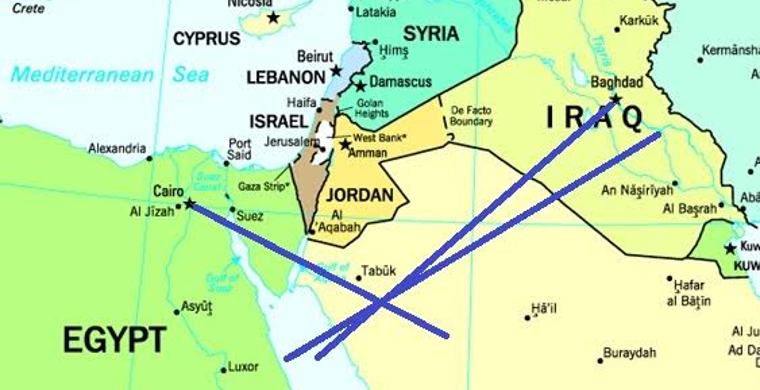Do Christians and Muslims Worship the Same God?
Are El and Al the same God
By Alice C. Linsley
Special to VIRTUEONLINE
www.virtueonline.org
January 8, 2016
With the rise of Islamic aggression, many question whether the God of Islam is the God of the Bible and the One revealed in the person of Jesus Christ. To adequately address this question, separate issues must be addressed. They are (1) the linguistic development of ancient names for God found in the Qur'an and the Bible, and (2) the theological distinctions between Islam's understanding of God and the Christian understanding of God.
Linguistic Development
The oldest known name for the Creator in the Bible is El (ʾēl) which corresponds to the Proto-Semitic ʔ-L. The L likely was a symbol of a throne or chief's seat and indicated power and authority. The Northwest Semitic ʾēl is cognate to the Proto-Arabic ʾIlāh and the Akkadian ilum. Akkadian was the language of Nimrod's kingdom in the Tigris-Euphrates Valley. Nimrod was a Kushite kingdom builder according to Genesis 10:8: "Kush became the father of Nimrod; he became a mighty one on the earth."
In Nigeria, the Hausa translation of the Bible uses Allah (Arabic: الله) to designate the Creator and the God and Father of Jesus Christ. Allah is also used in Syrian Bibles. As a designation for God, Allah corresponds to the archaic El in the Hebrew Bible, as Dios in Spanish corresponds to Dieu in French. The name was used among Arabian and Syrian peoples long before the time of Mohammad. Allah is the compressed expression of al-ilah, meaning THE God.
Among Abraham's ancestors there were many names for the Creator. These included YHWH, Yah, El and Ilum. Another ancient name for God as Father is Ausa, sometimes spelled Asa. The Asante tribe bears this name. Asa-nte means "the people of Asa." The Egyptian word Asa refers to God as father. The word "Hausa" probably has a similar meaning: ha-Ausa, meaning the people of God.
The older names for God can be identified by their simple roots, such as L, or by their bi-consonantal forms, such as YH or LM. The more recent Arabic and Hebrew words can be identified by a shift to bi-consonantal forms (called bilaterals) and triliterals. There are also a small number of quadriliterals in Hebrew and Arabic.
Old Arabic, also known as Dedanite, is closer to the archaic stratum of the Semitic roots due to its relative isolation in the Arabian Peninsula. Most Bible commentaries explain that the terms Dedan and Dedanite are from ded'-a-nim/dedhan/dedhanim, meaning "low." This is an odd interpretation since the Dedanites were known to dwell in elevated rock shelters. Genesis 10:7 provides the more accurate explanation that the Afro-Arabian Dedanites are related to the Kushite ruler Dedan. The original context is Kushite. In this context the word Dedan refers to the color red and is cognate to the Egyptian didi (red fruit) and the Yoruba diden (red). The Dedanites, along with the ancient Edomites, were known to have a distinctive red skin tone, like Esau and David.
It has been noted that the prayer alignments of the oldest mosques in Iraq and Cairo originally pointed to the region of Dedan, not to Mecca. The prayer orientation of Mohammad's original mosque in Medina was said to be toward Jerusalem, but could just as easily have been this same point in Dedan.
Dedan is where the largest collection of the oldest Arabic texts have been found at the oases of Teman and Dedan, present day Al-`Ula in Saudi Arabia. Jeremiah 49 links the Dedanites with the people of Teman. Eliphaz, the son of Esau and Adah (Genesis 36), is called a "Temanite" in Job 4:1. Eliphaz married a daughter of Seir, the Horite ruler of Edom.
The Dedanite alphabet consisted of 28 letters and resembled other scripts used in the Arabian Peninsula and in Syria, though Dedanite was distinctive in its use of the definite article h- or O (a sun symbol) whereas Southern Arabic and the Arabic spoken today uses the definite article al-. Not surprisingly, Dedanite and Hebrew have many common features, including the use of h- as the definite article "the" and use of matres lectionis to mark long vowels.
Theological Distinctions
Islam's God has definite characteristics. Some correspond to the revelation of the Bible. Allah is uncreated, merciful, just, omnipotent, and majestic. However, Allah is not triune in essence. Islam regards the events of Jesus' baptism, in which the Trinity was made manifest, to be a blasphemous narrative.
Allah has no son who overcomes death and leads his people to immortality. Al-Masih -- the Messiah -- is not born to crush the serpent's head (Genesis 3:15) and overcome death. He is not the Righteous Ruler to whom the Heavenly Father delivers the eternal kingdom. Instead, Messiah is the champion of Armageddon, the Mahdi, who leads Allah's forces in the final conquest over infidels. The Mahdi is NOT Jesus. Jesus is called al-Masih ad-Dajjal, which means "the false Messiah" in Arabic.
Islam's God justifies bloodshed for the globalization of Islam. The Old Testament grants divine approval of limited aggression against fortifications that once belonged to Israel's ruler-priest ancestors. The Bible does not advocate holy war to advance Judaism or Christianity. The violence prescribed in the Old Testament was for a particular time and limited to particular strongholds such as Jericho and Ai, both in Judea. No precedent was set for prolonged violent struggle beyond Judea. In contrast, the Qur'an prescribes military jihad to promote Islam worldwide. Consider these words of the Islamic theologian Syed Abul A'ala Maududi:
Islam wishes to destroy all states and government anywhere on the face of the earth which are opposed to the ideology and program of Islam regardless of the country or the nation which rules it. The purpose of Islam is to set up a state on the basis of its own ideology and program.
Islam's God does not offer forgiveness and redemption to the lost world. Salvation from hell is offered to Muslims alone. Consider this from the Qur'an:
O ye who believe! Fear Allah as He should be feared, and die not except in a state of Submission [that is as a Muslim]. And hold fast all together, by the rope which Allah stretches out for you, and be not divided among yourselves; remember with gratitude Allah's favor upon you: For ye were enemies and He joined your hearts in love, so that by His Grace ye became brethren, and ye were on the brink of the Pit of Fire and He saved you from it. Thus doth Allah make his signs clear to you: That ye may be guided. (Surah Ali 'Imran 3:102-103)
For Christ Jesus, the Son of God, to be glorified in the sight of Muslims, the love of Christians for one another must surpass that of Muslims. We must heed His words: "A new commandment I give to you, that you love one another, even as I have loved you, that you also love one another. By this all men will know that you are my disciples, if you have love for one another." (John 13:34, 35)
"We know that we have passed from death to life, because we love each other. Anyone who does not love remains in death." (1 John 3:14)
The God of Islam requires that all creatures worship Him. "And I have not created the jinn and the men except that they should worship me." (Quran 51:56) The God of the Bible grants humans the freedom to not worship the Creator. The Bible even acknowledges those who say in their heart that there is no God (Psalm 14:1).
Islam requires that all who would serve Allah adhere to the religion of Islam. "...This day have I perfected your religion for you, completed my favor upon you, and have chosen for you Islam as your religion..." (Quran 5:3)
The Bible defines true religion as this: "If anyone thinks himself to be religious, and yet does not bridle his tongue but deceives his own heart, this man's religion is worthless. Pure and undefiled religion in the sight of our God and Father is this: to visit orphans and widows in their distress, and to keep oneself unstained by the world." (James 1:26, 27)
"He has told you, O man, what is good; and what does the Lord require of you but to do justice, to love kindness, and to walk humbly with your God?" (Micah 6:8)
The God of Islam requires that all people serve Him. The God of the Bible self-reveals in Jesus Christ as one who came to serve. "For even the Son of Man did not come to be served, but to serve, and to give his life as a ransom for many." (Mark 10:45)
The Qur'an teaches that Jesus did not die on the Cross. For Muslims, this is a scandal. "For the message of the cross is foolishness to those who are perishing, but to us who are being saved it is the power of God." (1 Corinthians 1:18)
 Alice Linsley is a Christian Apologist. She has been pioneering the field of Biblical Anthropology for over 30 years. She teaches Philosophy and Ethics and is a member of the American Scientific Affiliation. She is a contributor to Virtueonline
Alice Linsley is a Christian Apologist. She has been pioneering the field of Biblical Anthropology for over 30 years. She teaches Philosophy and Ethics and is a member of the American Scientific Affiliation. She is a contributor to Virtueonline














